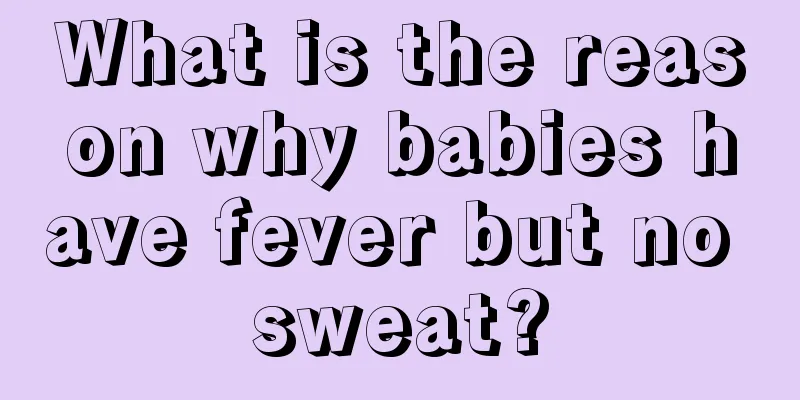What is the reason why babies have fever but no sweat?

|
Fever can be said to be the most common symptom of infants, mainly manifested as fever on the face. The editor reminds parents not to panic at this stage. Normally, they only need to take proper care. When the baby has a fever, they should not use drugs at will. The following editor will introduce to you the reasons for the baby's fever? Reasons why babies are prone to fever Infants and young children are prone to fever because they are more susceptible to viruses. Once the human body is infected by a virus, it will automatically produce antibodies, leading to an increase in white blood cell levels and raising the body temperature set point to resist the invasion of the virus, and the body temperature will rise accordingly. As people age, their bodies gradually produce more antibodies against viruses. Since infants and young children are often experiencing viral infections for the first time, they are more likely to develop fever due to infections. Common symptoms of fever in babies Fear of cold: Fear of cold is a symptom in the early stage of fever, and the body temperature may be less than 38℃ when measured. However, the child will have pale skin, dry skin without sweat, chills, sometimes accompanied by chills, muscle aches, weakness, etc. Increased body temperature: A rising body temperature and warm skin indicate that your child may have a fever. At this time, the child may experience flushing and burning of the skin, shallow and rapid breathing, accelerated heartbeat, headache, dizziness, loss of appetite, and general discomfort. Sweating: When a child has a fever due to infection, the body temperature will automatically rise to protect the body. At this time, in order to lower the body temperature and discharge heat, the body will sweat to lower the body temperature. How to reduce fever in babies When the child's body temperature is lower than 38.5℃, you don't need to use antipyretics. It is best to drink more boiled water and pay close attention to changes in the condition, or use physical cooling methods. If the body temperature exceeds 38.5℃, you can take antipyretics. Currently, commonly used antipyretics include paracetamol, children's Tylenol, Motrin, etc., but it is best to use them under the guidance of a pediatrician. After reading the above detailed introduction, you should have some understanding of the reasons why your baby has a fever. When your baby has a fever, he or she will show some clinical characteristics. This requires parents to pay more attention to observation when caring for their children. If your baby has a fever, you need to check and treat it in time. The editor hopes that your baby will recover soon. |
<<: How to supplement folic acid for babies?
>>: What is the reason why baby has poor appetite?
Recommend
The baby is born with blue veins on the bridge of the nose
The appearance of blue veins in the human body is...
What should parents do if their child’s vulva is red and itchy?
When women enter puberty, vaginal secretions begi...
Can moles on children's faces be removed?
Many children have very tender skin. If some chil...
What to do if baby has light eyebrows
Eyebrows are an important part of our face. They ...
How to provide nutrition for children
Today's parents are always worried about thei...
What to do if your child coughs while sleeping
Now many parents report that their babies always ...
How old can babies eat watermelon?
Watermelon is a relatively common fruit. Many fri...
Symptoms of stomach flu in children
Many people will find in life that children’s gas...
Small red spots on the child's face after fever
The small red spots that appear on a child's ...
How to deal with cold and nasal congestion in children
Because children have low immunity, they are very...
Causes of fever in children's hands and feet
Relatively speaking, children's constitution ...
What's wrong with a 16-month-old child who still can't speak?
Why does a child not speak at 16 months old? In f...
Is it okay to give a child a bath when he has a fever?
Many first-time mothers do not know what to do wi...
What to do if a child has a fever, shivering or chills
If children catch a cold, they will often have a ...
Causes of morning headaches in children
In fact, headaches are a very common phenomenon. ...









